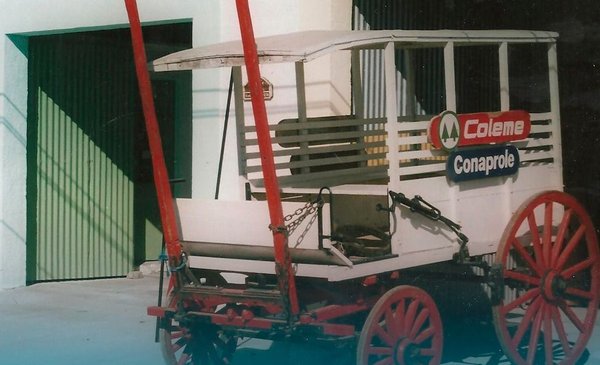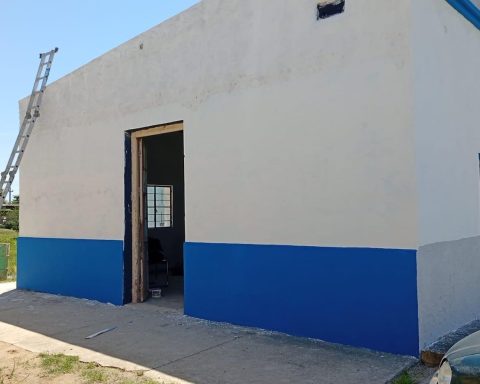Pioneers, this is how a group of 100 tamberos de Melo that produced and sold raw milk and came together to form the first pasteurizing industry in the country, and thus the first national dairy cooperative, the Melo Dairy Cooperative (colleme).
The history of this cooperative began in the National Parliamentwhen legislators voted for a law whose objective was to ensure that the entire population had access to pasteurized milk. Why that project? Because pasteurization cuts the chains of bacterial multiplication in milk, he explained to The Observer Eduardo Tornaría, current president of Coleme, and that prevents damage to health.
In order to reach this goal, it was defined that the technical school of each departmental capital would develop a pasteurizing plant that would allow, on the one hand, to generate this process –in which the milk undergoes temperature changes– and, on the other, to train people trained to continue with that task in the future.
In Melo, an area of the country with great dairy development, at that time all small family producers, the engineer Julio de Soto, who was director of the area’s technical school and very enthusiastic about the subject of pasteurization, began to unite the dairy farmers and to encourage the first pasteurizer to be there, in Cerro Largo.
It was so that little by little and looking to the future –thinking mainly about the benefits of selling pasteurized milk–, On April 28, 1932, the first board of directors of that group of dairy farmers was installed and Coleme was born..
And so the raw milk sold in the town at the hands of the tamberos went on to be marketed milk in glass bottles, with carton lids and pasteurized.
coleme
Coleme supplies milk to the department of Cerro Largo.
From the horse to the truck and from the bottle to the bag
With a pasteurizing plant, a logo of the cooperative and glass bottles engraved with the name of the company, Coleme was taking shape, and thus giving work not only to the tamberos, but also to the people of the town.
There were several good moments that the tamberos lived, and also several challenges that came their way. One of the main milestones for the cooperative occurred in the 1970s when a new pasteurizing plant was installed, which made it possible to increase the milk processing capacity, thereby aiming to have another commercialization scale.
From horse-drawn carriages with the Coleme logo, they later moved on to trucks, and from glass bottles to plastic bags. Over time, the company changed and in that process it had ups and downs, recalled Tornaría, who has been a dairy farmer since the 1990s.

coleme
Coleme plant, in Melo.
One of the lows of those ups and downs was when, due to the larger size of the plant, idle capacity was generated that the dairymen could not cover. At that time, and after a union highly valued by the tamberos, Coleme made an agreement with Conaprole so that it would supply the milk that the Cerro Largo basin did not have.
That agreement, which lasted many years, allowed the work started years ago by those pioneer dairy farmers from Melo to spread more and the work to grow. And from selling milk they also went on to sell products such as cheese. Some, which were sold under the Conaprole brand throughout the country, were made at the Coleme plant.
resilient
And like everything in life, in addition to the good times, the bad ones also came. In 2017 the plant suffered “a gap” and the cooperative entered a “quite compromised” situationcounted, the president. For 20 months the plant was closed and only the production of pasteurized milk remained.no longer that of cheeses, several workers went to unemployment insurance and the activities changed.
But after a renewal of the directive, new processes, support from producers, political actors and workers who were willing to resign part of their salaries so that the colleagues on unemployment insurance could resume their activities, the work was prosecuted. Thus, in 2018 a new board of directors, headed by producers from Fraile Muerto, began to lead the cooperative.
“This shows the resilience that cooperatives have, that they are capable of reinventing themselvesbecause they always have human resources that perhaps were not being used and appear at other times”, he commented.

coleme
Currently there are 20 dairy farms that send to Coleme.
A window of opportunities
Teamwork, one of the bases of cooperativism, is what characterizes Coleme, which this weekend hosted the celebrations for the International Day of Cooperatives. Every year an area of the country is chosen as the National Capital of Cooperatives, and this 2023 was the turn of Cerro Largo, a place where national authorities and members of the agrarian cooperatives met. Coleme is part of the Federated Agrarian Cooperatives (CAF) union that mainly brings together groups of family producers.
There are currently 20 dairy farms sending milk to Coleme, and fewer dairy farms does not mean less production, the president pointed out., since the Cerro Largo basin has had significant growth, he said. Some of the establishments produce hundreds of liters per day and others up to 4,000. The base global delivery of the cooperative is between 15,000 to 20,000 liters, and in the spring it increases.
In the industry, 60 people from the area work in the elaboration of products, with the objective of supplying the population of Cerro Largo.
After the setbacks, and with the creation of the Financing and Sustainable Development Fund for Dairy Activity (Ffdsal) approved by the government at the end of 2022, Coleme saw “a window of opportunity and hope that opened” and that is how it headed to a reconversion of the industry to adapt to the reality of 2023, with a view to continuing to fulfill the dreams of those pioneers of the 1930s who believed in the sector as family development in rural areas.
















